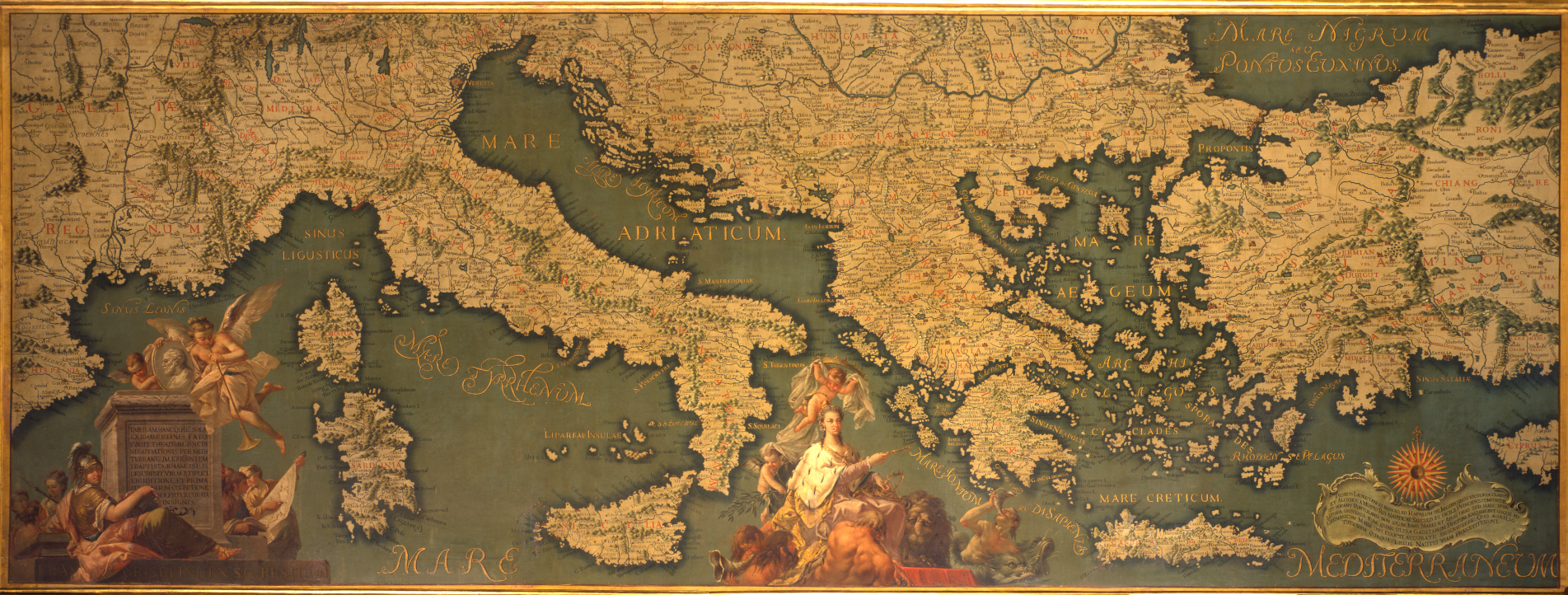Comune di Venezia
 F. Grisellini e G. Menescardi, Mediterraneo Italia Balcani Anatolia, Palazzo Ducale, Sala delle Mappe
F. Grisellini e G. Menescardi, Mediterraneo Italia Balcani Anatolia, Palazzo Ducale, Sala delle Mappe
Where
When
Venice's natural element is water but its most illustrious citizen travelled by land. It was in 1271 that a young man named Marco Polo left Northern Italy for China to accompany his father on a trading expedition. The long journey to the East, on the so-called "Silk Road", lasted more than three years due to bad weather, wars and disease, whereas his stay in Asia was 25 years long: during this period of time, the Venetian man was able to win the Mongol Emperor's trust to such an extent that he became one of his most trusted advisor and high officials.
Born in Venice in 1254 into a family of merchants, Marco Polo certainly was one of the best-known figures in the history of the Serenissima. With his extraordinary exploits between reality and myth, which are narrated in the book known in Italian as "Il Milione" (in English is commonly referred to as "The Travels of Marco Polo"), he gave the first reliable and complete account of the East, and the first contribution to mutual understanding between Asia and Europe. In particular, the book gave an accurate descriptions not only of China and the Asian continent, but also, and for the first time, of the vast world of islands, from Japan to Madagascar.
Marco Polo's journey alongside his father and uncle began in Venice and spanned across Turkey, Persia, Afghanistan and the Gobi Desert. In 1275, the three travellers arrived in Katai, a region in Northern China, part of the Grand Khan of the Mongols. The Great Khan Kublai, the Mongol emperor who at the time was ruling over China, considered Marco well-versed in languages and a brilliant young man: it was for this reason that he decided to entrust the Venetian with the task of managing the administration in various parts of his Empire.
After living seventeen years in China and another six or seven travelling across the world then known, Marco Polo returned to Venice. It was in 1295 and he was 40. Shortly afterwards, while taking part in a naval battle between the Maritime Republics of Venice and Genoa, he was held prisoner by the enemies of the Serenissima. It was on this occasion that he recounted his memoirs to Rustichello da Pisa, an Italian romance writer. This was the birth of "Il Milione", a masterpiece of travel literature and one of the first geographic encyclopaedias, a historical and geographical treatise, a book of exploration which, for its relevance, is still considered a pillar of Italian literature. Marco Polo's "Il Milione" has come a long way, and will continue to do so, because scholars have not yet finished studying its many curiosities.
To him, the Venetian traveller par excellence, main characters of the Serenissima Republic, on the occasion of the 700th anniversary of his death, which occurred on the 8th of January 1324, the City of Venice will dedicate a year of widespread events, to continue writing the pages of an imaginary tale that has never ended, full of adventures and emotions. The City Council, which promotes and coordinates the programme related to the celebrations, intends to flank to the initiatives promoted directly and to those prepared by stakeholders in the Venice area, other projects chosen by subjects operating within Italy or abroad.
Public and private stakeholders, who in various ways have historical ties to the City of Venice and are interested in putting forward proposals to be included in the programme of events, are invited to submit their projects. What suggested will be part of a collective calendar that will be used as a tool for the promotion of activities and a communication platform addressed to an international audience, as wide as possible.
The notice regarding the submission of initiatives and projects is available on this website.
